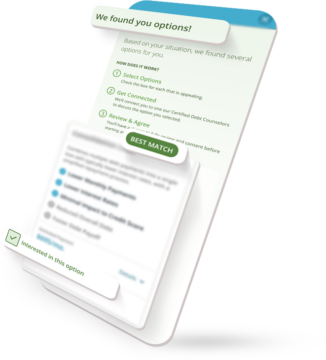
Instant Debt Advisor℠ is the FASTEST way to get out of debt.
- Created by debt experts to analyze your situation.
- Provides personalized recommendations in 3 minutes.
- Puts you on the right path to get out of debt fast.

OUR MISSION
Our job is simple: It doesn’t matter what got you into debt, we’ll help get you out – and keep you out. That’s it. That’s all we do. And for 10 years, we’ve done it better than anyone else.
When Life Happens …
1
DO YOUR RESEARCH
Check out our proven debt-busting strategies you can do on your own. If you still need help, we’re here for you…
2
TELL US WHAT’S WRONG
In 3 minutes or less, we’ll customize the perfect solution for whatever debts you have. It’s painless and confidential.
3
CONNECT WITH EXPERTS
Debt.com only works with accredited professionals who obey our Code of Ethics – so you can trust you won’t get scammed.
4
START A DEBT-FREE LIFE
You’ll see progress that will give you peace of mind, and Debt.com will teach you how to stay out of debt in your brand-new future.
$12,000
The average debt our clients resolve.
50
STATES
We meet the strict requirements of every state in the country.
EST.
2013
Debt.com is one of the oldest and largest debt-solution providers in the nation.
REAL COUNSELORS, REAL SOLUTIONS
How Much Could You Save?
Just tell us how much you owe, in total, and we’ll estimate your new consolidated monthly payment.
A LIFE OF DEBT DONE RIGHT
It’s almost impossible to avoid debt. But we can show you how to control it – instead of letting it control you.
LATEST FINANCIAL NEWS
-
4 Times Martin Luther King Jr. Taught Us About Money
The civil rights activist’s financial advice and opinions have often been overlooked.
-
Financial Fiasco 2024: We’re Over-Spending – and Over-Confident
It’s a new year with the same old problem. But it doesn’t have to be…
-
The ‘Sleeper Recession’ and ‘Sandwich Inflation’
Summing up 2023 and looking ahead to 2024.







